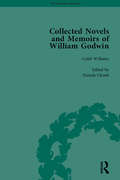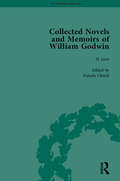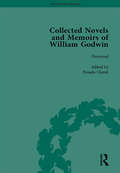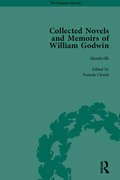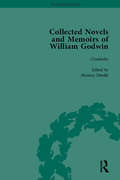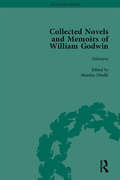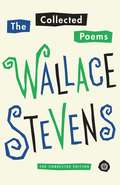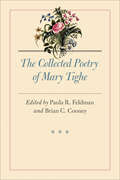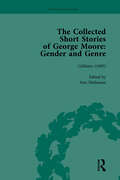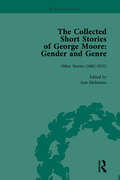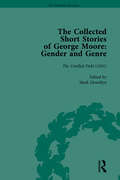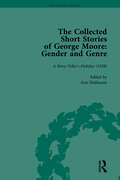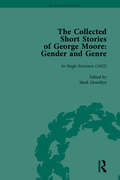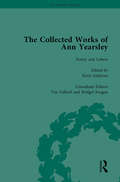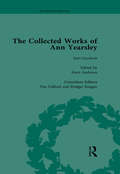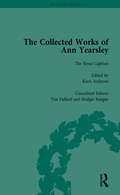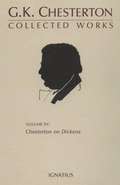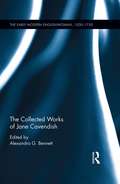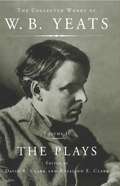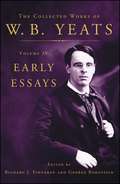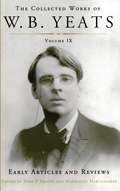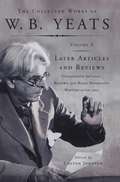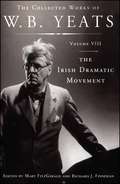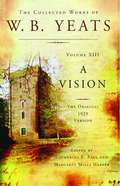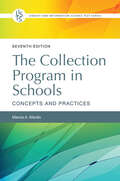- Table View
- List View
The Collected Novels and Memoirs of William Godwin Vol 3 (The\pickering Masters Ser.)
by Maurice Hindle Mark Philp Pamela ClemitA collection in eight volumes of the novels and memoirs of William Godwin, one of the foremost philosophers and radical thinkers of his age. There is a general introduction covering Godwin's life and literary works and each volume is prefaced by a scholarly introduction.
The Collected Novels and Memoirs of William Godwin Vol 4 (The\pickering Masters Ser.)
by Maurice Hindle Mark Philp Pamela ClemitA collection in eight volumes of the novels and memoirs of William Godwin, one of the foremost philosophers and radical thinkers of his age. There is a general introduction covering Godwin's life and literary works and each volume is prefaced by a scholarly introduction.
The Collected Novels and Memoirs of William Godwin Vol 5 (The\pickering Masters Ser.)
by Maurice Hindle Mark Philp Pamela ClemitA collection in eight volumes of the novels and memoirs of William Godwin, one of the foremost philosophers and radical thinkers of his age. There is a general introduction covering Godwin's life and literary works and each volume is prefaced by a scholarly introduction.
The Collected Novels and Memoirs of William Godwin Vol 6 (The\pickering Masters Ser.)
by Maurice Hindle Mark Philp Pamela ClemitA collection in eight volumes of the novels and memoirs of William Godwin, one of the foremost philosophers and radical thinkers of his age. There is a general introduction covering Godwin's life and literary works and each volume is prefaced by a scholarly introduction.
The Collected Novels and Memoirs of William Godwin Vol 7 (The\pickering Masters Ser.)
by Maurice Hindle Mark Philp Pamela ClemitA collection in eight volumes of the novels and memoirs of William Godwin, one of the foremost philosophers and radical thinkers of his age. There is a general introduction covering Godwin's life and literary works and each volume is prefaced by a scholarly introduction.
The Collected Novels and Memoirs of William Godwin Vol 8 (The\pickering Masters Ser.)
by Maurice Hindle Mark Philp Pamela ClemitA collection in eight volumes of the novels and memoirs of William Godwin, one of the foremost philosophers and radical thinkers of his age. There is a general introduction covering Godwin's life and literary works and each volume is prefaced by a scholarly introduction.
The Collected Poems of Wallace Stevens
by Wallace StevensThis definitive poetry collection, originally published in 1954 to honor Stevens on his 75th birthday, contains:- "Harmonium"- "Ideas of Order"- "The Man With the Blue Guitar"- "Parts of the World"- "Transport Summer"- "The Auroras of Autumn"- "The Rock"
The Collected Poetry of Mary Tighe
by Paula R. Feldman and Brian C. CooneyThe most complete collection of Mary Tighe’s poetry published to date.Mary Blachford Tighe (1772–1810) was a crucial force in shaping British Romanticism. Her influential six-canto epic, Psyche, or the Legend of Love (1805), along with her shorter poems, engaged the central issues of the period, often in advance of writers now considered canonical. With remarkable vitality and virtuosity, Tighe wrote about the tensions between love and loss, duty and desire, the spiritual and the sensuous, nation and family, and the Irish and the British, all while struggling with the debilitating illness that eventually claimed her life. This scholarly edition collects for the first time dozens of recently discovered poems, accompanied by Tighe’s own illustrations, and identifies eight false attributions. A historical and biographical introduction from editors Paula R. Feldman and Brian C. Cooney discusses Tighe’s work within a larger social and political context, placing renewed emphasis on the conflicts she experienced as a Methodist with Anglo-Irish roots. Editorial annotations shed new light on Tighe’s life, revealing for the first time, for example, that her songs were performed during her lifetime on the Dublin stage.Meticulously edited, this volume builds on recent pioneering scholarship to restore and burnish Tighe’s reputation as a major Romantic-era poet.
The Collected Short Stories of George Moore Vol 1: Gender and Genre
by Ann Heilmann Mark LlewellynGeorge Moore (1852-1933) was one of the most influential and versatile writers and journalists of the turn of the century. This five-volume, reset critical edition addresses scholarly interest in Moore, making available his generally neglected short story collections.
The Collected Short Stories of George Moore Vol 2: Gender and Genre
by Ann Heilmann Mark LlewellynGeorge Moore (1852-1933) was one of the most influential and versatile writers and journalists of the turn of the century. This five-volume, reset critical edition addresses scholarly interest in Moore, making available his generally neglected short story collections.
The Collected Short Stories of George Moore Vol 3: Gender and Genre
by Ann Heilmann Mark LlewellynGeorge Moore (1852-1933) was one of the most influential and versatile writers and journalists of the turn of the century. This five-volume, reset critical edition addresses scholarly interest in Moore, making available his generally neglected short story collections.
The Collected Short Stories of George Moore Vol 4: Gender and Genre
by Ann Heilmann Mark LlewellynGeorge Moore (1852-1933) was one of the most influential and versatile writers and journalists of the turn of the century. This five-volume, reset critical edition addresses scholarly interest in Moore, making available his generally neglected short story collections.
The Collected Short Stories of George Moore Vol 5: Gender and Genre
by Ann Heilmann Mark LlewellynGeorge Moore (1852-1933) was one of the most influential and versatile writers and journalists of the turn of the century. This five-volume, reset critical edition addresses scholarly interest in Moore, making available his generally neglected short story collections.
The Collected Works of Ann Yearsley Vol 1
by Tim Fulford Bridget Keegan Kerri AndrewsPresents the works of Ann Yearsley, a laboring-class poet' whose writing forms part of an under-represented area of romanticism. This work includes her play "Earl Goodwin" and novel "The Royal Captives".
The Collected Works of Ann Yearsley Vol 2
by Tim Fulford Bridget Keegan Kerri AndrewsPresents the works of Ann Yearsley, a laboring-class poet' whose writing forms part of an under-represented area of romanticism. This work includes her play "Earl Goodwin" and novel "The Royal Captives".
The Collected Works of Ann Yearsley Vol 3
by Tim Fulford Bridget Keegan Kerri AndrewsPresents the works of Ann Yearsley, a laboring-class poet' whose writing forms part of an under-represented area of romanticism. This work includes her play "Earl Goodwin" and novel "The Royal Captives".
The Collected Works of G. K. Chesterton, Volume 15: Chesterton on Dickens
by G. K. Chesterton Alzina Stone Dale<p>It is not widely known that the author of the Father Brown detective stories, Orthodoxy and The Everlasting Man was also an accomplished man of letters and a literary critic of the first order. This volume brings back into print GKC's masterful Critical Study of Charles Dickens, his Appreciations and Criticisms of the Works of Charles Dickens which is made up of the individual introductions he wrote for Dickens' complete works, and The Victorian Age in Literature. Among three additional, smaller pieces will be found Chesterton's article in The Encyclopaedia Brittanica on Charles Dickens, and a speech Chesterton gave at a Dickens Commemoration Dinner entitled "The Immortal Memory of Charles Dickens". <p>The reader of this volume will not only learn much more about Charles Dickens and other Victorian writers, but also about the fascinating mental universe in which Dickens wrote his literary masterpieces. And, finally, as always with G.K. Chesterton, one will learn to see with fresh eyes that magical universe we all inhabit but which both Dickens and Chesterton have helped us to see in all its variety and splendor.</p>
The Collected Works of Jane Cavendish (The Early Modern Englishwoman, 1500-1750: Contemporary Editions)
by Alexandra G. BennettThe first scholarly edition of the complete works of Jane Cavendish, this volume presents as complete a collection as possible of works and historical documents pertaining to a particularly compelling figure from the English Civil War. These include two manuscript poem and play collections, family letters to and from Jane, dating from after the Civil War years, and important estate papers. Jane Cavendish and her nearest sister, Elizabeth Brackley, are the only known collaborative female dramatists of the early modern period, and the co-composers of the first extant stage comedy by women in English. Most of Jane's extant verse and dramatic works were composed when the fighting of the English Civil War was at its most intense. Her works are, therefore, particularly valuable to both literary and historical researchers of the period because they simultaneously play with established literary conventions and convey much first-hand information about the conditions of aristocratic life during and immediately after the seventeenth-century national meltdown. The introduction offers as comprehensive a biography of Jane Cavendish as possible, focusing primarily on Jane's childhood, education, and conduct during the Civil War, as well as her married life after the war years. Of particular interest among the documents that follow is an account-book including entries from Jane's teenage years as well as her early married life; it portrays vividly what a young lady of her status owned in terms of clothes and jewels, as well as what a newly married woman had to acquire upon setting up a new household.
The Collected Works of W. B. Yeats Vol II: The Plays
by William Butler YeatsThe Collected Works of W. B. Yeats, Volume II: The Plays is part of a fourteen-volume series under the general editorship of eminent Yeats scholars Richard J. Finneran and George Mills Harper. This complete edition includes virtually all of the Nobel laureate's published work, in authoritative texts and with extensive explanatory notes. The Plays, edited by David R. Clark and Rosalind E. Clark, is the first-ever complete collection of Yeats's plays that honors the order in which the plays first appeared. It provides the latest and most accurate texts in Yeats's lifetime, as well as extensive editorial notes and emendations. Though best known as one of the most important poets of the twentieth century, from the beginning of his career William Butler Yeats understood the value of his plays and his poetry to be the same. In 1923, when he accepted the Nobel Prize for Literature, Yeats suggested that "perhaps the English committees would never have sent you my name if I had written no plays...if my lyric poetry had not a quality of speech practiced on the stage." Indeed, Yeats's great achievement in poetry should not be allowed to obscure his impressive and innovative accomplishments as a dramatist. In The Plays, David and Rosalind Clark have restored the plays to the final order in which Yeats planned for them to be published. This volume opens with Yeats's introduction for an unpublished Scribner collection and encompasses all of his dramatic work, from The Countess Cathleen to The Death of Cuchulain. The Plays enables readers to see clearly, for the first time, the ways in which Yeats's very different dramatic forms evolved over the course of his life, and to appreciate fully the importance of drama in the oeuvre of this greatest of modern poets.
The Collected Works of W. B. Yeats Volume IV: Early Essays
by Richard J. Finneran George Bornstein William Butler YeatsThe Collected Works of W. B. Yeats, Volume IV: Early Essays is part of a fourteen-volume series under the general editorship of eminent Yeats scholars George Bornstein and George Mills Harper. These volumes include virtually all of the Nobel laureate's published work, in authoritative texts with extensive explanatory notes. Early Essays, edited by the internationally esteemed Yeats scholars George Bornstein and the late Richard J. Finneran, includes the contents of the two most important collections of Yeats's critical prose, Ideas of Good and Evil(1903) and The Cutting of an Agate(1912, 1919). Among the seminal essays are considerations of Blake, Shakespeare, Shelley, Spenser, and Synge, as well as an extended discussion of the Japanese Noh theatre. The first scholarly edition of these materials, Early Essays offers a corrected text and detailed annotation of all allusions. Several appendices gather materials from early printings which were later excluded, as well as illuminating black-and-white illustrations. Early Essays is an essential sourcebook for understanding Yeats's career as both writer and literary critic, and for the development of modern poetry and criticism. Here, Yeats works out many of his key ideas on poetry, politics, and the theater. He gives interpretations of writers critical to his development and presents a compelling vision of Ireland and the modern world during the last decade of the nineteenth century and first two decades of the twentieth. As T. S. Eliot remarked, Yeats "was one of those few whose history is the history of their own time, who are a part of the consciousness of an age which cannot be understood without them." This volume displays a crucial part of that history.
The Collected Works of W. B. Yeats Volume IX: Uncollected Articles and Reviews Written Between 1886 and 1900
by William Butler Yeats John P. Frayne Madeleine MarchaterreThe Collected Works of W. B. Yeats, Volume IX: Early Articles and Reviews is part of a fourteen-volume series under the general editorship of eminent Yeats scholars Richard J. Finneran and George Mills Harper. This first complete edition includes virtually all of the Nobel laureate's published work, in authoritative texts with extensive explanatory notes. Coedited by John P. Frayne and Madeleine Marchaterre, Early Articles and Reviews assembles the earliest examples of Yeats's critical prose.
The Collected Works of W. B. Yeats Volume X: Uncollected Articles, Reviews, and Radio Broadcasts Written After 1900
by William Butler Yeats Colton JohnsonThe Collected Works of W. B. Yeats, Volume X: Later Articles and Reviews is part of a fourteen-volume series under the general editorship of eminent Yeats scholars Richard J. Finneran and George Mills Harper. This first complete edition includes virtually all of the Nobel laureate's published work, in authoritative texts and with extensive explanatory notes. Later Articles and Reviews consists of fifty-four prose pieces published between 1900 and Yeats's death in January 1939.
The Collected Works of W.B. Yeats Volume VIII: The Irish Dramatic Movement
by Richard J. Finneran William Butler Yeats Mary FitzgeraldThe Collected Works of W. B. Yeats, Volume VIII: The Irish Dramatic Movement is part of a fourteen-volume series under the general editorship of eminent Yeats scholars Richard J. Finneran and George Mills Harper. This complete edition includes virtually all of the Nobel laureate's published work, in authoritative texts and with extensive explanatory notes. Edited by the distinguished Yeats scholars Mary FitzGerald and Richard J. Finneran, The Irish Dramatic Movement gathers together -- for the first time -- all of the poet's time-honored essays on drama and the groundbreaking movement that led to the enduring Irish theater of today. Although the reputation of W. B. Yeats as one of the preeminent writers of the twentieth century rests primarily on his poetry, drama and the theatre were among his abiding concerns. Indeed, in 1917 he wrote, "I need a theatre; I believe myself to be a dramatist." Here in this volume is the collection of all his major dramatic criticism for the years 1899-1919, including previously uncollected material. A practicing dramatist himself, Yeats had strong convictions about the goals of the Irish theater and the appropriate plays to be produced. The essays in this collection address many topics, from the turbulent early years of what became the Abbey Theatre to the controversies over the plays of John Millington Synge and the relationship between drama and nationalism. Also evident are Yeats's judgments on numerous plays, playwrights, and productions, both in Irish and in English. FitzGerald and Finneran's volume includes an Introduction and a History of the Text, as well as copious but unobtrusive annotation. The Irish Dramatic Movement is an essential volume for both readers of Yeats and students of the early years of twentieth-century theater.
The Collected Works of W.B. Yeats Volume XIII: The Original 1925 Version
by William Butler Yeats Catherine E. Paul Margaret Mills HarperThe Collected Works of W. B. Yeats, Volume XIII: A Vision is part of a fourteen-volume series under the general editorship of eminent Yeats scholar George Bornstein and formerly the late Richard J. Finneran and George Mills Harper. One of the strangest works of literary modernism, A Vision is Yeats's greatest occult work. Edited by Yeats scholars Catherine E. Paul and Margaret Mills Harper, the volume presents the "system" of philosophy, psychology, history, and the life of the soul that Yeats and his wife George (née Hyde Lees) received and created by means of mediumistic experiments from 1917 through the early 1920s. Yeats obsessively revised the book, and the revised 1937 version is much more widely available than its predecessor. The original 1925 version of A Vision, poetic, unpolished, masked in fiction, and close to the excitement of the automatic writing that the Yeatses believed to be its supernatural origin, is presented here in a scholarly edition for the first time. The text, minimally corrected to retain the sense of the original, is extensively annotated, with particular attention paid to the relationship between the published book and its complex genetic materials. Indispensable to an understanding of the poet's late work and entrancing on its own merit, A Vision aims to be, all at once, a work of theoretical history, an esoteric philosophy, an aesthetic symbology, a psychological schema, and a sacred book. It is as difficult as it is essential reading for any student of Yeats.
The Collection Program in Schools: Concepts and Practices (Library and Information Science Text Series)
by Marcia A. MardisThis thorough treatment of collection development for school library educators, students, and practicing school librarians provides quick access to information. <P><P> This seventh edition of The Collection Program in Schools is updated in several key areas. It provides an overview of key education trends affecting school library collections, such as digital textbooks, instructional improvement systems, STEM priorities, and open education resource (OER) use and reuse. Topics of discussion include the new AASL standards as they relate to the collection; the idea of crowd sourcing in collection development; and current trends in the school library profession, such as Future Ready Libraries and new standards from the National Board for Professional Teaching Standards.
